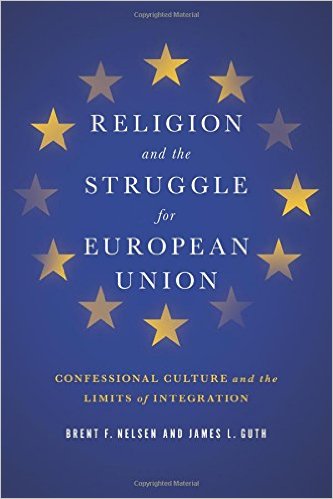If you wanted to explain why some countries seem more favorable toward European integration than others, what cleavage would be most important: North-South, East-West, rich-poor, or Catholic-Protestant? No doubt any difference matters, at least potentially, and many of these cleavages are overlapping. We could invent a few others as well related to linguistic families, kinship structures, or even physical geography. Nevertheless, it helps to tell the story if you can focus attention on whatever offers the best prospect of combining simplicity with coherence. By implication, you have to make a choice about what matters most.
For Brent Nielsen and James Guth, the choice is religion. Specifically, they focus attention on the cultures that have emerged within the Catholic Church and the Protestant Reformation. Their argument is that Catholics tend to be more accepting and supportive of European integration while Protestants are more insistent on national distinctiveness. There are obvious exceptions. Poland and Ireland combine Catholicism with nationalism in a way that does not quite fit the argument; Croatia would probably fall into that camp as well (although it does not feature in their analysis). There are also mixed countries like Germany and the Netherlands whose attitudes appear ‘complex and paradoxical’ (p. 247) – at least until the differences between Catholic and Protestant national elites are taken into account.
Despite the bluntness of the religious division, they are able to make a compelling argument. The narrative they tell is rich with quotations that blend religious symbolism with political aspirations and the broad structure of the narrative is credibly coherent. Protestants rely on geographic separation and autonomy to preserve their attempts at reformation; Catholics strive for unity to reassert their claim to universalism. The argument rests on a firm foundation of statistical analysis as well. Nielsen and Guth have pioneered the use of Eurobarometer data to explore the correlations between religious devotion and European identity; here they put the findings of their many large statistical models to good use.
Nielsen and Guth also express a broader aspiration to underscore the importance of culture to our understanding of Europe and to revive interest in the ‘transactionalist’ theory of European integration initially developed by Karl Deutsch. Here they are less successful. The problem is the benchmark. They contrast their approach with intergovernmentalism and other theories that emerge from international relations when institutionalist approaches from comparative politics and political economy are more relevant. Such approaches have already created space for introducing norms and values into attitudes toward integration. They offer a compelling account of the willingness to participate in Europe that integrates economic self-interest (and other motivations) into the analysis. This is not to suggest that religion is unimportant or that you cannot narrate the history of integration using the Catholic-Protestant divide as a frame of reference. Rather it is to admit that such a narrative is only one perspective on a rich and heavily overdetermined process.
Religion and the Struggle for European Union: Confessional Culture and the Limits of Integration. By Brent F. Nielsen and James L. Guth. Washington, D.C.: Georgetown University Press, 2015. Xvi + 368 pp.
Follow @Erik_Jones_SAISThis book review was originally published in the June/July 2016 issue of Survival. You can access the edited version of this review and other book reviews published in that issue here.
